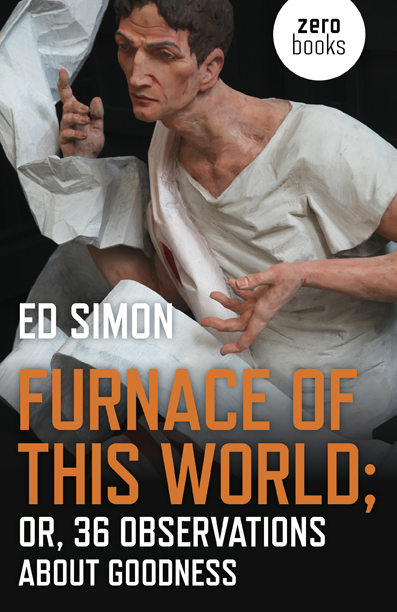Furnace of this World
A fragmentary, digressive, impressionistic account of what the radical implications of goodness could possibly be in late capitalism.

A fragmentary, digressive, impressionistic account of what the radical implications of goodness could possibly be in late capitalism.
A fragmentary, digressive, impressionistic account of what the radical implications of goodness could possibly be in late capitalism.
Critical theory, Ethics & moral philosophy, Religion
In the tradition of Roland Barthes' Mythologies and Walter Benjamin's aphoristic Theses on the Philosophy of History, Ed Simon's Furnace of this World is a fragmentary, digressive, impressionistic account of what the radical implications of goodness could possibly be in late capitalism. Furnace of this World interrogates the concept of goodness, while arguing that it's always more interesting and radical than its opposite. With neither hubris nor reductionism, Furnace of this World speaks of what it means to pursue justice in a fallen world.
Click on the circles below to see more reviews
Imagine you stop to listen to a street corner preacher calling out to no one and everyone. Imagine that, like a subway musician who hits a lick that catches your year, he piques your interest with a vision that is like an impossible mashup of William James and George Carlin. Reading Ed Simon's ruthless Furnace of this World is like pausing for hour, ninety minutes tops, to listen to a wise stranger who is equal parts poet, prophet, and philosopher. You will be quiet, you will be rapt, and you will never be the same. ~ J.C. Hallman, author of B & Me: A True Story of Literary Arousal
Against the assumption that to look for and find goodness in today's world is either dangerous, or naive, or both, comes Ed Simon's Ruthless Furnace of This World. This exuberant and erudite collection insists on the paradoxical power of good to exist where we least expect it. The book is the rare one that demonstrates what it describes - that we can amplify goodness with our own compassion, humility, and heart. Like William Blake writing The Lives of the Saints or Nietzsche drawing a map to Utopia, Simon succeeds on his own impossible terms. Embracing both Broadway and Bonhoeffer, AA and Augustine in its expansive geography of goodness, Simon's work is profound, often heartbreaking, yet surprisingly cheering. ~ Brook Wilensky-Lanford, author of Paradise Lust: Searching for the Garden of Eden
Between the struggle for religious certitude and stick-in-the-mud atheism is Ed Simon's honest and authentic exploration of the language of morality. Opting for story over the tired debate of "does God exist," Simon presents narratives of faith and doubt from across literature to instruct the reader that literalism in any form will never bring us as close to a well-lived life as the simple and quiet search for the good. ~ Peter Bebergal, author of Strange Frequencies
Ed Simon's writing is perfectly suited to his theme, and reflects his preoccupations as a deep, wide-ranging and generous reader and thinker who applies his skills to address the fundamental question of human goodness. ~ Lydia Kiesling, editor at The Millions, and author of The Golden State